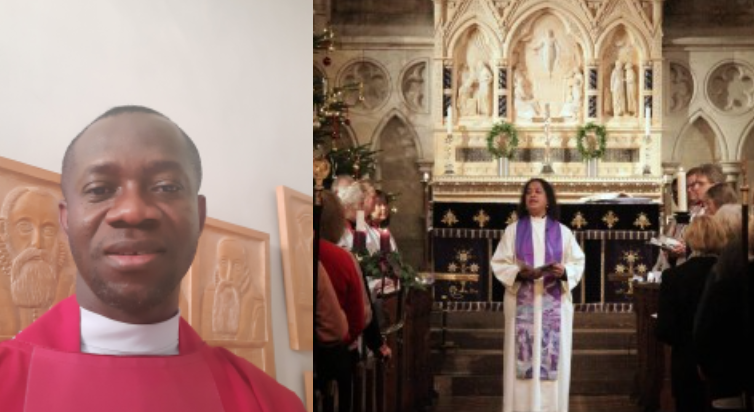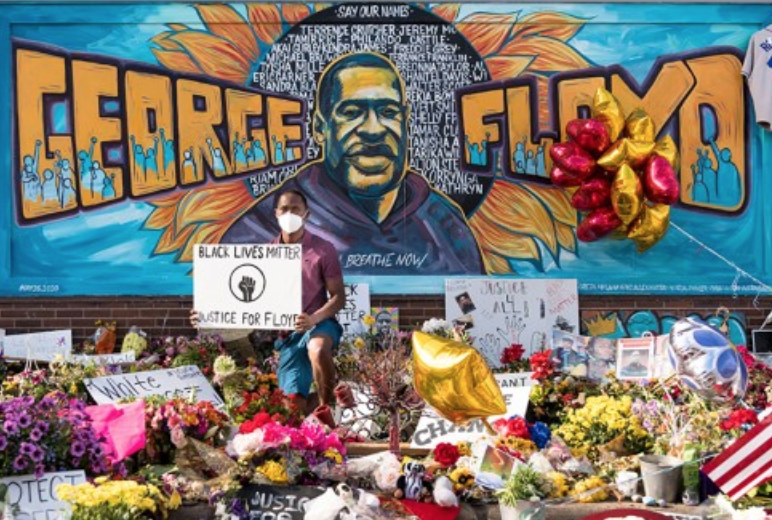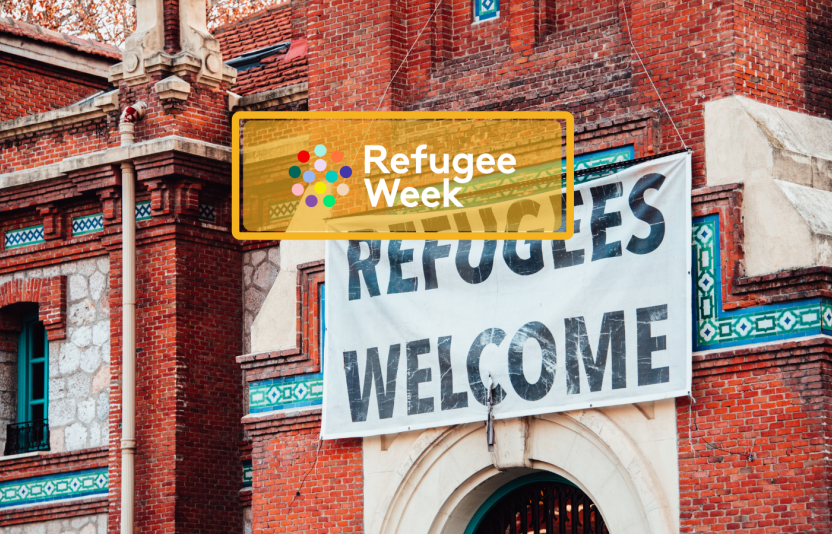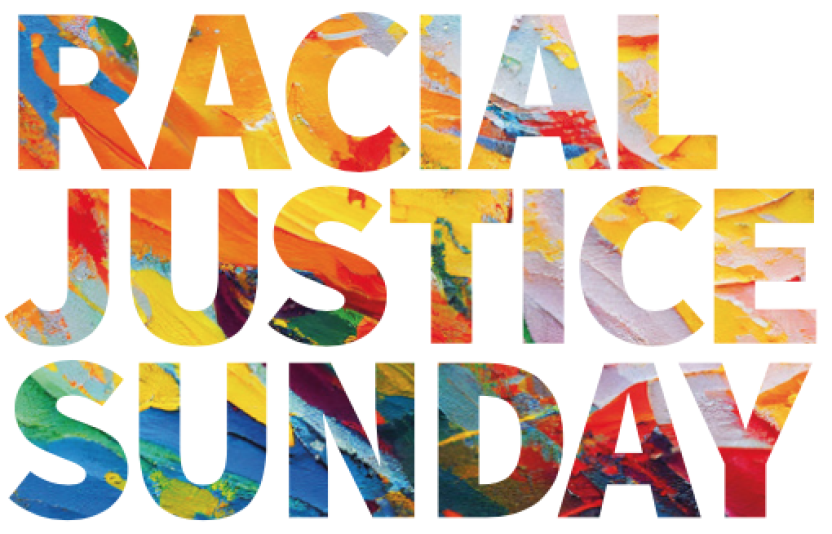Racial Justice: Interview with Diocesan BAME champions

We have two BAME champions and advisers to Bishop Robert in the Diocese, The Revd Augustine Nwaekwe (pictured left), Chaplain in Ostend-Bruges & Knokke, and The Revd Smitha Prasadam (pictured right), Chaplain at St Alban’s, Copenhagen.
As we prepare to discuss racial justice at Diocesan Synod today with the presentation of the "Breathing Life" report before Synod today, Augustine and Smitha offer their perspectives and reflections in this interview with Damian Thwaites:
DT: What was your reaction at the death of George Floyd in Minneapolis, USA on 25 May this year?
AN: I reacted with deep shock. This was a very patient act, I would say the patience of evil, seeing how the killer-police officer waited patiently for those 8 minutes and 46 seconds until his victim could no longer breathe. To see the police who should protect life now becomes responsible for destroying life, is an atrocity.
SP: “Can this really be happening?” I asked myself while subconsciously registering gratitude the scene was captured on camera. “Here we go again,” I thought! “More police brutality against a black man.” You’re 10 times more likely to be arrested if you’re black and just as George Floyd’s life breath was snuffed out, black lives are squeezed and silenced in churches, streets, workplaces and almost everywhere. Every time a person of colour is denied, discriminated or killed, a silent scream goes up: “I can’t breathe.”

DT: Do you think the outrage could have occurred as easily in Denmark or Belgium?
SP: Denmark’s “samfund” or strong, community spirit puts it top in Europe in the fight against Corona. Less well-known is a conformity and suspicion of the stranger or “invandra” who comes over the water. Along with cosy “hygge,” there’s “hygge racism” where people have to justify their very existence. Freedom of speech saw extremists set fire to the Qu’ran and sees asylum seekers confined for years without public protest. Yet Black Lives Matter brought 15,000 protesters even in lockdown. Carpe Diem!
AN: The police in Belgium may not be as brutal, but it doesn’t mean there’s no racism. In Belgium, there is subtle racism. However, some people experience it differently. There was a demonstration in Bruges in favour of Black Lives Matter. The Mayor opened a petition at the city hall, but some severely criticized the Mayor for doing this. It is very offensive to think black lives do not matter, and I have read some critical views saying that that if a white man had been killed in that way, that demonstration would not have happened. Every human life must be held as sacrosanct, not minding the colour.
DT: What can we do to support BAME sisters/brothers?
AN: These questions come up, proposals are made, and often there are no actions to follow up. Church and society need to create an enabling environment for every person to flourish. The structures could be made in a way to equally empower people of colour, such that people of colour could be part of structures and the hierarchy of governance. If they could play leadership roles, that would go a long way to give voice to the younger generation of BAME people and in supporting the BAME community.
SP: My heart aches at General Synod’s Seeds of Hope published in 1991 which resulted in little change over 30 years. Unconscious bias is ever present in our midst. We need to equip and empower BAME representation and participation in every aspect of our common life at diocesan, deanery, council, committee and board level. Complementarity can only happen when contributions come irrespective of pigmentation. Our own Archbishops confess that racism is embedded in our church structures, o we need to allow BAME communities to find their voice and play their part. Every chaplaincy and group has the opportunity to let BAME people through the door, not only to clean brasses and floors. Imagine if even one BAME person was on every Chaplaincy Council! It would make a significant difference. This is about complexion and complexity. God’s gift of colour is both glorious and gory and we need to mentor and educate our congregations and grow BAME leaders. Colour as an identifier is an accident of birth; and holds innate privileges and prejudices. It’s not “them and us” but us together which works by us all embracing our Christ-like identity which is greater than any one ethnic identity. Perhaps there could be a six-week course rooted in Scripture or resources where foreigners reveal the divine to learn our common heritage in salvation history.
DT: What do you think the Diocese in Europe should be doing on BAME issues?
AN: BAME is a doing thing, not a talking thing. The Diocese needs to commit to it. Sometimes, when there is a genuine vocational call, the routes for BAME candidates are limited.
I can see that finance could be a major problem for some BAME candidate to proceed with the discernment process. Our work as BAME advisers is just starting. If we want to “do BAME”, this will sometimes need mission funding channeled towards BAME vocational discernment in cases where BAME candidates or their chaplaincies are struggling with funding. We should try to strategise with Diocesan financing and education. The Diocese needs to commit to finance and without it, it is going to be a problem due to inequality of means among candidates. The Diocese has to be honest about this kind of issue.
We also need to identify chaplaincies with BAME people, welcoming their gifts, ministries and talents.
SP: Like discussions on human sexuality and environment, racism also needs to be an ongoing discussion. The Church should not avoid it. The more it is avoided; the more the experiences of BAME people are not heard, and the more racism and unconscious bias take hold of both church and society. At Synods and Chaplaincies, we need to celebrate diversity, root out racism and challenge custom and practice which favours one ethnicity over another.
DT: You’re part of a wider Church of England BAME network – what are you learning from other members of this network?
AN: I attended a conference in Leicester organized by the Ministry Division for networking and encouragement of vocations among BAME people. It was an opportunity to listen to those working in the field including Bishop Guli Francis-Deqhani. From such networking, it is clear that we have the challenge of identifying chaplaincies with BAME communities, and to map out ideas on how to support them. We need materials to tell people of colour they should play their part and also materials to the wider community on the need to talk about race. Unconscious bias should be spoken about. Silence is part of the problem. We cannot be silent about it, and there is sin in silence. It is very dangerous, and inclusivity is now urgent.
SP: Being the “English church” is quaint but tramples on other backgrounds and ethnicities in a diocese of 42 countries. We are Anglican Christians. We need to change our terminology, language and landscape. Take our liturgy and hymnody. If we only stick to Victorian nostalgia, we do not create space for the wealth of global Anglican expression. Could we make room for prayer and hymns of Hindi, Farsi or Swahili origin for example? When I hear ‘black people aren’t in our congregation’, I say “Open your eyes! Encourage them!” We need to befriend; belong; advocate change; champion justice, and speak out against discrimination. Silence is collusion, cowardice and complicity and we need to act for racial justice which isn’t a constitutional right so much as a Gospel imperative.
DT: In the Covid-19 environment, how do you think people can make their voices heard?
SP: Digital technology has increased our capacity, connectivity and community. Zoom has brought us ever closer and we meet differently. Our home and Bible study groups have doubled in size without the necessary commute. People buzz in online coffee hubs, synods, Council meetings and quizzes. As nurses, consultants, cleaners, clergy, or other, the BAME community is much more vulnerable to Covid-19. If BAME front-liners are of such value to society, how much more could they contribute to the better health of our churches? The BAME contribution is sacrificial and we owe them a debt of gratitude.
AN: Assuming that we didn’t have these new technologies, the issue of George Floyd would not have been known. In the present environment, social media becomes a powerful way of lending our voices. It is a blessing we can now communicate like this. It has got people engaged in protest and we’re getting news of these killings and similar events in real time. The eyes of the world have now been opened. It is such shame that this is happening in our time, when it could easily be assumed mistakenly that racial discrimination was over.
DT: Has technology been a barrier for BAME people in our Diocese do you think?
SP: We’ve streamed services since lockdown began and the congregation has grown virtually. It’s more of a barrier to our elders than BAME people who are techno-savvy in highly digitized Denmark. St Alban’s Chaplaincy Council committed itself to gifting those in need and without technology a tablet/ device so that everyone is connected and a part of the church community.
AN: In Bruges and Ostend chaplaincy council, we have a few people who are BAME members and they are part of our council meetings on zoom. Our BAME members have also been able to participate at Bible study fellowships and Sunday services on zoom. It’s been more difficult for the elderly. I had a Jamaican lady of 82 years who has no way to communicate or follow our church services; she sent a card of thanks to me for sending her my sermons.
We have BAME members following on Facebook services, and my daughter has helped with the technical assistance to create YouTube channel and videos and taking care of Livestreaming of services via Facebook.
DT: Physical gatherings are limited by law across the Diocese. Would you advise people to gather or go online to protest on BAME issues?
AN: I would say both, but preserving social distancing when people gather. My main concern is not demonstrating, it is people challenging racist actions in a timely manner. You need to identify when a racist remark is made or when a racist attitude is displayed. We have to have the courage to challenge what is not good. Not only about speaking, but also taking action. If you’re in charge of an organization, how do you treat other people? Are you opening doors, and encouraging diversity?
SP: Prayer is protest. It is the biggest way we can influence any change. But we need to be persistent in prayer. It’s how we show our real sense of interdependence saying “I am nothing without you.” In our social media savvy age, I can add my voice to protests with a simple “share” or “like”etc! Protest paves the way. It allows someone else a share of something you prize. Protest does not rejoice in wrongdoing but rejoices in the truth. Protest budges and encourages others - not necessarily on a demo but as participant, representative, reader, intercessor, councillor and friend.
DT: What gives you hope?
SP: Speaking or hearing the gospel afresh gives me real hope. During lockdown I emailed everyone a prayer each morning and evening with a seasonal photo to address anxiety and helplessness and offer assurance of God’s constancy. Unsolicited, people started sending their own photos; and sender and scene became prayer prompts. Over 200 prayers to 300 people and only 3 “unsubscribed!” Now in the season of expectant hope, St Alban’s virtual Advent Calendar is a daily blessing of scripture, carols, poems and prayers from members and partners. Take a peep at www.st-albans.dk! It’s a hope-filled, creative Christmas; countering Covid and reflecting people of all ages and hues breathing life together.
AN: As chaplain in Bruges and Ostend, I have seen in both church council and Church life, a sense of working together. Membership of Council displays our Christian belief in quality and dignity with people of colour who are deeply loved and cherished. My three daughters asked of George Floyd “why was that man killed?” To the youngest one, I could not explain. If we allow racism to continue it will affect future generations. There is psychological trauma for children, where they see people of colour being discriminated against. But in the church, we can be the model for the society, not the other way. That is the church we are becoming in our part of Flanders.
DT: And from passages of Scripture … ?
AN: I draw inspiration from our liturgy expression: “Though we are many, we are one body because we all share in the same bread“. We all share in the same body and blood of Christ. God’s concern is all creation. When I see my children with their friends, black and white all together, I see a foretaste of the Revelation of Saint John of new order where people from every tribe and language assemble before the throne. When will this be reality? When black and white will be together without either being made to feel less human? God’s idea and creation is one human race, only human actions split us into different races.
SP: What we’re trying to do is to live the reality of God where there “is no longer Jew or Greek, slave or free, male or female for all are one in Christ Jesus.” (Galatians 3.28). All that divides us now is inconsequential in the realm of eternity. For God’s coming Kingdom of justice, mercy and peace I want to sing Psalm 72 with all my might: “He comes with succour speedy to those who suffer wrong/ to help the poor and needy and bid the weak be strong/ to give them songs for sighing, their darkness turn to light/ whose souls condemned and dying, were precious in his sight.” I sing for a dawn when righteousness is reality.
**
Ahead of today's Synod discussion, Bishop Robert said:
‘This is an area of the church’s life where progress and change have been painfully slow. I am deeply grateful to Augustine and Smitha for their insights and urging us to action. From time to time we glimpse in our diocese a foretaste of the biblical vision of people from every tribe, language and tongue gathered around the throne of the Lamb. In this season of Advent, I long for the implications of that vision to be worked out in their glorious fullness amongst us.’


